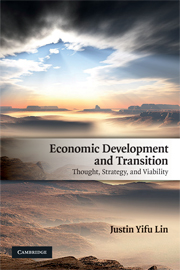Book contents
- Frontmatter
- Contents
- List of figures
- List of tables
- Preface
- 1 Development, transition and divergence
- 2 The search for a fundamental and changeable cause of prosperity
- 3 Aspirations and social thought of modernisation
- 4 Development strategy, viability and performance
- 5 Viability and strategies of transition
- 6 Development strategy, development and transition performances: empirical analysis
- 7 Why are east Asian economies so special? Are there any general lessons to be learnt from east Asian development and transition experiences?
- 8 Towards a right development and transition strategy
- Appendix 1 Development strategy and economic institutions in developing countries
- Appendix 2 Data description
- References
- Index
7 - Why are east Asian economies so special? Are there any general lessons to be learnt from east Asian development and transition experiences?
Published online by Cambridge University Press: 05 June 2012
- Frontmatter
- Contents
- List of figures
- List of tables
- Preface
- 1 Development, transition and divergence
- 2 The search for a fundamental and changeable cause of prosperity
- 3 Aspirations and social thought of modernisation
- 4 Development strategy, viability and performance
- 5 Viability and strategies of transition
- 6 Development strategy, development and transition performances: empirical analysis
- 7 Why are east Asian economies so special? Are there any general lessons to be learnt from east Asian development and transition experiences?
- 8 Towards a right development and transition strategy
- Appendix 1 Development strategy and economic institutions in developing countries
- Appendix 2 Data description
- References
- Index
Summary
East Asian economies seem to be rather special in terms of their development and transition performance since the Second World War. Development ‘miracles’ occurred in the NIEs in east Asia and transitional miracles in China and Vietnam. If, as I have argued, social thought is the deepest and most fundamental determinant of government policy and social and economic institutions in a country – in turn determining a country's economic performance – why is it that, despite the prevailing social thinking about development in the 1950s and 1960s and about transition in the 1980s and 1990s, the east Asian governments behaved so differently and achieved such miraculous economic success? My analysis is incomplete without an answer to this question.
As discussed, China, Vietnam and other east Asian economies adopted a dual-track, gradualist approach in their transition from centrally planned economies to market economies, which violated the basic tenets of the Washington Consensus and the shock therapy treatment. In effect, for its transition from a wartime economy after the Second World War, Japan also adopted a gradual approach, whereas Germany adopted a big-bang approach (Teranishi, 1994). In terms of the development policies in South Korea and Taiwan, both governments initially adopted a policy mix – including financial repression, overvalued exchange rates, deficit budgets and neglect of the agricultural sector – to support the development of labour-intensive primary manufacturing industries in order to reduce the need for imports of manufactured household products: a policy referred to as ‘primary import substitution’.
- Type
- Chapter
- Information
- Economic Development and TransitionThought, Strategy, and Viability, pp. 81 - 91Publisher: Cambridge University PressPrint publication year: 2009



